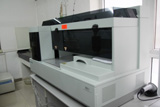How To Use Antibiotics For The Renal Insufficiency
2018-07-14 11:54
 Before treating patients with renal insufficiency, we should first understand the pharmacokinetic characteristics of the drug, especially the main metabolic pathway of the drug. For drugs that are mainly excreted or metabolized by the kidney, the dosage should be correspondingly reduced according to the degree of renal function damage of the patient.
Before treating patients with renal insufficiency, we should first understand the pharmacokinetic characteristics of the drug, especially the main metabolic pathway of the drug. For drugs that are mainly excreted or metabolized by the kidney, the dosage should be correspondingly reduced according to the degree of renal function damage of the patient.
Patients with renal insufficiency often have a variety of complications or concomitant diseases, such as anemia, hypertension, cardiac insufficiency, and malnutrition. Patients often need to be treated with a variety of drugs for a long time. In addition, renal insufficiency itself and various complications can often lead to decreased resistance, making patients easily infected with pathogenic microorganisms, the most common being bacterial infections, including common bacteria and tubercle Bacillus infections. Therefore, the frequency of antibiotics used by patients with renal insufficiency is very high. If we do not pay attention to the adjustment of the dosage of these patients, they will often cause drug accumulation poisoning and bring serious adverse reactions to the patients. Among the commonly used antibiotics, penicillin and cephalosporin poisoning are easy to induce neuropsychiatric symptoms, while isoniazid, an anti-tuberculosis drug, and gastrointestinal motility drugs such as metoclopramide poisoning are easy to cause extrapyramidal symptoms. Therefore, before treating patients with renal insufficiency, doctors should first understand the pharmacokinetic characteristics of the drug, especially the main metabolic pathway of the drug. For drugs that are mainly excreted or metabolized by the kidney, the dosage should be correspondingly reduced according to the degree of renal function damage of the patient.
A middle-aged male uremic patient who has been undergoing hemodialysis regularly for one and a half years. Because of heart failure complicated with pulmonary infection, a hospital gave penicillin in a conventional dose and 6.4 million u of intravenous application every day while treating heart failure. On the 3rd day of treatment, the symptoms of the patient's lung infection improved obviously, but the mental symptoms appeared. the symptoms included confusion of mind, hallucination, incoherent speech, irritability and indifference. according to the patient's dialysis condition and cardiopulmonary function, the encephalopathy caused by uremic encephalopathy and hypoxia caused by insufficient dialysis was excluded. It was considered that the patient could not excrete penicillin in a regular dose due to renal failure, causing drug accumulation and inducing central nervous system symptoms. The patient's mental symptoms gradually disappeared after drug withdrawal and dialysis times were increased to speed up drug elimination.
According to the above comments about the usage of antibiotics the patients must pay attention to it, but to the renal insufficiency the reasonable treatment is more necessary than only taking antibiotics ,then natural treatment with Chinese herbal medicine in Beijing Tongshantang Hospital of Traditional Chinese Medicine can give the patients more effective treatment without any side effect, if you want to know more about that treatment, please contact us through the following message:
E-mail: kidneyservice@hotmail.com
WhatsApp: +8615512139310
Any kidney problems? Please consult our online doctor. The satisfaction of patient is as high as 93%.
What you also want to know:
How can I get this treatment ?
How can I get this treatment in my counties ?
How much is this treatment ?
What is the duration if I receive this treatment in your hospital ?
How can I go to your hospital ?
Tag: Antibiotics Renal Insufficiency Natural Treatment Pharmacokinetic characteristics Main metabolic pathway Complicattions or concomitant disease Pathogenic microorganisms Bacterial infections
Pre: How To Treat Glomerulonephritis In Children
Next: With the 24% Renal Function Left If A Patient Can Avoid Dialysis
Leave a Message
Any questions?Fill the form below and we will surely attend to you within 24 hours.Free medical answers from experts!
About Hospital
Patient Story
- The Key Point In The Course Of Treatment
- Drinking More And Urinate Frequently Means Kidney Problems
- How To Deal With Occult Blood With Correct Methods.
















